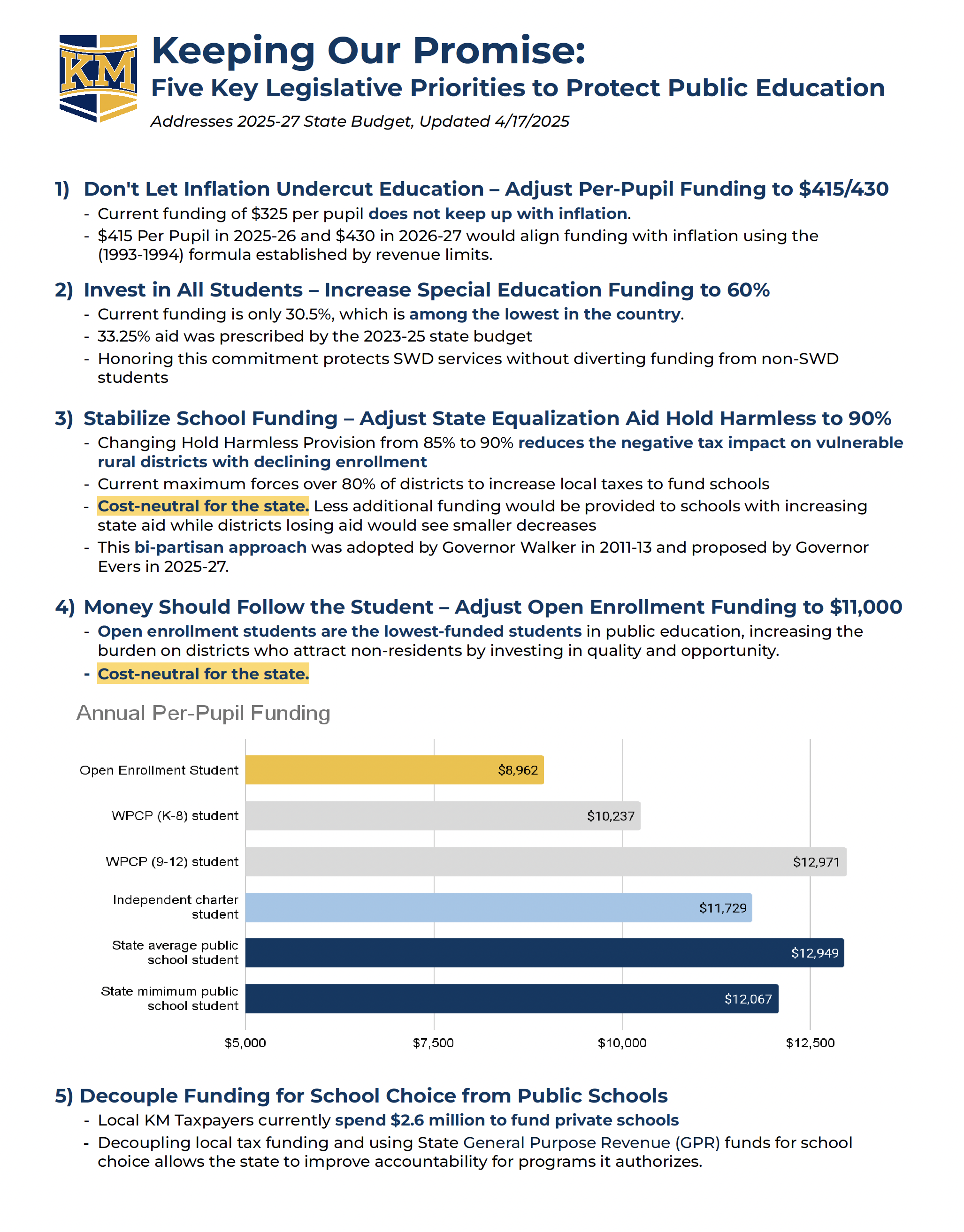Legislative Advocacy
The Kettle Moraine School District's school board and administrators are committed to informing our state government of the challenges currently faced in education, and advocating for fairer funding for public schools.
If you would like additional information on legislative advocacy please feel free to reach out to our committee members: Liz Nottling, Amy Richards, John Stellmacher, Sara Otto, and Steve Plum, through the staff section in our district menu.
Understanding Legislative Priorities
Investing in Students
The Kettle Moraine School District prioritizes student outcomes, opportunity, and choice. From welding stations, to kilns, to STEM labs, we have provided the tools students need to thrive in the real world. This level of academic excellence requires investments in both staffing and equipment. This commitment to student outcomes has made KM a destination district, attracting more than 600 open enrollment students.
Why is open enrollment important? Our district represents an aging population with declining numbers of school-aged children. Open enrollment helps us to offer more enrichment opportunities for students by generating adequate numbers for these courses. Unfortunately, as you can see from the chart at right, OE students are funded at a much lower rate (only $8,962 per pupil) than any other type of student, with state average resident per pupil funding coming in at $12,949.
Accountable to Community
Our strategic plan includes an overarching theme of fiscal responsibility. School funding has not kept up with inflation, private school vouchers have negatively impacted revenue, and only a small percentage of the funding required to meet the needs of students with disabilities (SWD) is provided by the state. This forces school districts to make difficult decisions on what they are able to provide for students and families.
As a result, KM is engaged in a fiscal planning process that will right size our district to maintain our fiscal strength in a climate of declining revenue and enrollment. We are also making a concerted effort, in conjunction with our school board and community, to inform state legislators and the Governor of the challenges current funding models present, especially for rural districts with high SWD populations.
Behaving Responsibly
We believe state funding models should reward districts who invest in academic achievement. In many cases, the districts who are "doing it right" are overlooked by policymakers who are focused on lifting up districts that are struggling. This is especially illustrative in the low per pupil funding for open enrollment, and state equalization aid models. While we understand the importance of a quality education for ALL students, we also believe that funding models should not be developed in conjunction with interest groups and should reflect the needs of rural, suburban, and urban districts.
KM provides class sizes that are among the lowest in the state. We also maintain low caseloads for SWD educators to adequately support our most vulnerable students. We feel there should be a system of incentives at the state level for districts that behave responsibly, provide an exceptional education, and avoid wasteful spending and excessive debt. The current model leans toward "bailing out" districts that are struggling to meet these needs.
What You Can Do!
Contact your state and local representatives to advocate for fairer funding. If you join us in our communication efforts, we can ensure that smaller districts like ours are heard. This is an important step in creating pressure for appropriate funding for ALL Wisconsin school districts. We encourage you to write, email, or call your representatives to help keep Wisconsin schools adequately funded.
Find Your State and Federal Legislators: Go to legis.wisconsin.gov. On the right-hand side of the page, under “Who Are My Legislators?” enter your home street address and city. Click Find Your Legislator. You will see a map of your legislative district and photos of your representative and senator in the Wisconsin State Legislature. To view your representative and senator in the United States Congress, click For more information, click here, then click on U.S. House of Representatives and U.S. Senate. You can also reach your legislators by calling the Legislative Hotline. In Madison, dial 266-9960. Toll-free, call 1-800-362-9472.
You can also find which committees* they serve on, biographical information and how they voted on important issues related to education. To locate this information, click on the legislator’s name.
Find Your Local Elected Officials: Local elected officials include county board supervisors, the county executive, the district attorney, the county clerk, the clerk of courts, the sheriff and others. The Wisconsin Counties Association website provides a listing of county websites. Each website is different, but you can find a tab labeled “county government,” “elected officials” or “county board” that will put you on the right track.
Connecting With the Governor's Office: The governor plays a significant role in determining education spending. While the legislature determines the amount of funding allocated, the governor can use the line-item veto power to modify spending, including school funding formulas. Additionally, the governor proposes and supports a biennial budget that outlines state spending priorities, including education. The governor can be reached at https://evers.wi.gov/pages/connect.aspx.
Share Your Stories: If you have a personal story related to funding education, we encourage you to share it with us, is it might help us to understand the needs people have and how we can incorporate that into our messaging.
